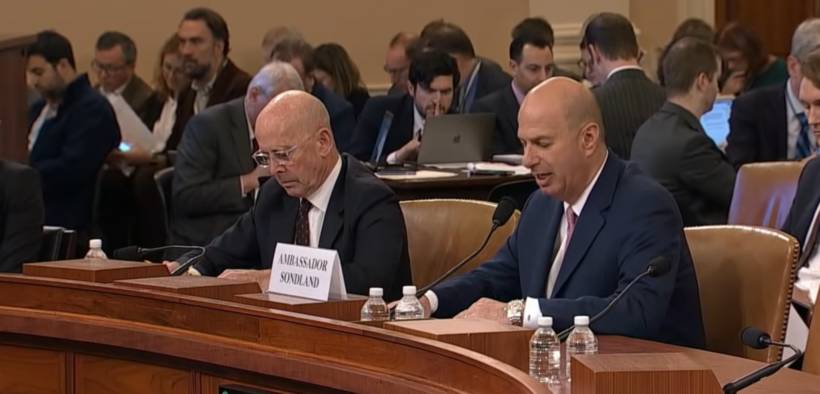Impeachment Hearings Update: Were the Public Trials Really Bombshells?

Trump’s defense and survival of impeachment hearings may fall on the loyalty of four close confidants – Mulvaney, Giuliani, Pompeo, and Bolton.
The House Intelligence Committee completed the public trial phase of the Trump impeachment inquiry on Thursday, leaving commentators divided after seven rapid-fire impeachment hearings with 12 witnesses over the past two weeks. According to Axios, House Democrats and Republicans are now drafting separate reports to deliver to the Judiciary Committee, each offering recommendations for how to proceed.
What Actually Happened During the Impeachment Hearings?
The witnesses broadly corroborated their private testimonies over the past two weeks, centered on the allegation that the Trump administration sought to withhold $391 million in security assistance from Ukraine in order to pressure the country’s government to open a publicized investigation into Joe Biden’s son’s involvement with Ukrainian natural gas company Burisma.
On Thursday, Fiona Hill, the White House’s former top Europe and Russia expert, was lauded by liberal commentators for her clear testimony and condemnation of the GOP’s “fictional narrative” alleging that Ukraine meddled in the US election. Critics note there was some Ukraine meddling in the 2016 election.
“He was being involved in a domestic political errand, and we were being involved in national security foreign policy,” said Hill. “And those two things had just diverged.”
U.S. Ambassador to the European Union, Gordon Sondland, who was appointed to his position after donating $1 million to Trump’s inaugural committee, also gave what many considered to be a “bombshell” testimony on Wednesday:
“Everyone was in the loop,” Sondland said at the hearing. “It was no secret. Everyone was informed via email on July 19, days before the Presidential call. As I communicated to the team, I told President Zelensky in advance that assurances to ‘run a fully transparent investigation’ and ‘turn over every stone’ were necessary in his call with President Trump.”
“I know that members of this Committee have frequently framed these complicated issues in the form of a simple question: Was there a ‘quid pro quo?’ As I testified previously, with regard to the requested White House call and White House meeting, the answer is yes,” the ambassador added.
Notably, the administration did freeze Ukraine aid in alignment with the witnesses’ timelines and only released it after the whistleblower’s complaint in August. However, hard evidence proving the president’s intentions in the aid freeze will likely remain elusive unless the president’s closest aides, including Giuliani, Pompeo, Mulvaney, and Bolton, defy his orders and testify.
Were the Hearings Really Bombshells?
From presidential candidate Julián Castro to the New Republic’s Matt Ford, liberal commentators broadly viewed Sondland’s testimony as devastating for Trump’s legal defense.
The Nation’s Aaron Maté, on the other hand, criticizes the motivations driving the inquiry and believes that media outlets’ excessive attention on “venerating a procession of hawkish bureaucrats and parsing their every word” rather than policy issues will be harmful to Democrats in 2020. A recent Emerson poll found growing opposition to the impeachment hearings among independent voters alongside increased approval ratings for Trump.
Maté notes that Sondland, the only witness to have spoken directly with Trump, may have claimed there was a quid pro quo between the proposed investigation and Ukrainian President Zelensky’s White House visit, yet he never explicitly linked the Burisma probe to frozen military aid in the hearing. Sondland said that Trump never mentioned that military funding at all, and that he only presumed that the aid was contingent on the Burisma investigation “in the absence of any credible explanation.”
While Maté acknowledges that Sondland’s presumption may be correct, he argues that “a plausible presumption is not the same as evidence for a provable, impeachment-worthy case:”
“The impeachment hearings leave us with a gap between the evidence presented and the maximalist, ‘bombshell’ interpretations drawn from it. That’s nothing new. The same dynamic drove Russiagate for nearly three years until it collapsed. And just like Russiagate, a major driver of Ukrainegate is an underlying hawkish posture toward Russia.”
Bloomberg views the same evidentiary gap emphasized by Maté as allowing Trump’s impeachment defense to remain “hanging by a thread” after the week of damaging public testimonies. Trump’s survival now depends on the quartet of men who could fill that gap – Mulvaney, Giuliani, Pompeo, and Bolton – following his orders not to testify.







